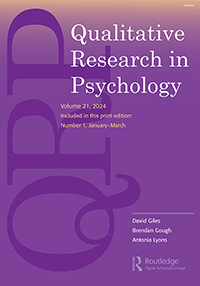问卷是如何塑造经历过的症状的。心理治疗研究问卷管理的定性个案比较研究
IF 4.4
3区 心理学
Q1 PSYCHOLOGY, MULTIDISCIPLINARY
引用次数: 14
摘要
通过自我报告问卷量化症状测量是评估心理治疗疗效的“金标准”的一部分。在这篇论文中,我们报告了一个定性的案例比较,以探讨June和Amy,两个金标准心理治疗研究的患者参与者,如何经历定量数据收集的过程。该研究类似于认知访谈研究,但通过调查患者在实际心理治疗中问卷管理的经验来推进这些研究。这两个案例都报告了在解释预先结构化的项目和响应格式、沟通管理员-被调查者动态和响应变化方面的已知问题。除了已知的评分问题外,问卷管理的行为改变了他们对所经历症状的解释,这促进了临床改变,而不仅仅是治疗效果。对Amy来说,这种改变与改善有关,但对June来说,问卷管理促进了经历症状的恶化。这些发现强调,在临床实践中考虑测量效果在认识论和伦理上都是至关重要的。本研究证明了在心理治疗研究中采取定性立场的重要性,因为定性研究可以详细说明问卷得分的语境和特质性质,并强调研究人员和临床医生都必须注意得分在参与者临床故事中的意义。本文章由计算机程序翻译,如有差异,请以英文原文为准。
How questionnaires shape experienced symptoms. A qualitative case comparison study of questionnaire administration in psychotherapy research
ABSTRACT Quantified symptom measurement by self-report questionnaires is part of the ‘gold standard’ of assessing psychotherapeutic efficacy. In this paper, we report a qualitative case comparison to explore how June and Amy, two patient-participants in a gold standard psychotherapy study, experienced the process of quantitative data collection. The study resembles cognitive interviewing studies conducted in the development of measures, yet advances them by investigating patients’ experiences of questionnaire administration in actual psychotherapy. Both cases reported known issues in interpretation of pre-structured item- and response formats, communicative administrator-respondent dynamics, and response shifts. Beyond known scoring problems, the act of questionnaire administration changed their interpretation of experienced symptoms, which facilitated clinical change beyond therapeutic effects. For Amy, this change was associated with improvement, but for June, questionnaire administration facilitated deterioration in experienced symptoms. These findings emphasize that it is both epistemically and ethically vital to consider measurement effects in clinical practice. This study demonstrates the importance of taking a qualitative stance in psychotherapy research, as qualitative research can elaborate the contextual and idiosyncratic nature of questionnaire scores, and highlights that both researchers and clinicians have to be attentive to the meaning of scores as words in participants’ clinical stories.
求助全文
通过发布文献求助,成功后即可免费获取论文全文。
去求助
来源期刊

Qualitative Research in Psychology
PSYCHOLOGY, MULTIDISCIPLINARY-
CiteScore
20.00
自引率
0.50%
发文量
14
期刊介绍:
Qualitative Research in Psychology is an international, peer-reviewed journal that publishes high-quality, original research. It aims to become the primary forum for qualitative researchers in all areas of psychology, including cognitive, social, developmental, educational, clinical, health, and forensic psychology. The journal also welcomes psychologically relevant qualitative research from other disciplines. It seeks innovative and pioneering work that advances the field of qualitative research in psychology.
The journal has published state-of-the-art debates on various research approaches, methods, and analytic techniques, such as discourse analysis, interpretative phenomenological analysis, visual analyses, and online research. It has also explored the role of qualitative research in fields like psychosocial studies and feminist psychology. Additionally, the journal has provided informative articles on ethics, transcription, interviewee recruitment, and has introduced innovative research techniques like photovoice, autoethnography, template analysis, and psychogeography.
While the predominant audience consists of psychology professionals using qualitative research methods in academic, clinical, or occupational settings, the journal has an interdisciplinary focus. It aims to raise awareness of psychology as a social science that encompasses various qualitative approaches.
In summary, Qualitative Research in Psychology is a leading forum for qualitative researchers in psychology. It publishes cutting-edge research, explores different research approaches and techniques, and encourages interdisciplinary collaboration.
 求助内容:
求助内容: 应助结果提醒方式:
应助结果提醒方式:


